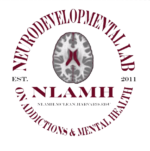Views: 765
McLean Teen Yoga Study

Commitments
4-weeks of virtual, zoom yoga online surveys and assessments
Compensation
Includes payment, Fitbit, yoga mat, and blocks
How to Join
Click below
About Us
NLAMH investigates the overlap between brain development, substance use and mental illness, perhaps helping to explain clinical symptom onset, e.g., depression and anxiety. Together with our adolescent work, we are investigating the consequences of emerging adult (18-24 yrs) binge drinking on brain structure and chemistry to probe neurobiology underlying “What were you thinking?” — brain mechanisms associated with impulsive and risky behaviors. We also are investigating brain chemistry, mood and cognition in depression. Collectively, we aim to identify who’s at greatest risk for addiction and psychiatric disorders.
Learn Our Statistics: COMING SOON
Areas of Research
Brain GABA levels during adolescence: Links to Alcohol Use (Silveri et al., 2013)
This area focuses on healthy development of GABA in the frontal lobe during adolescence, and the impact of initiation of alcohol use. Our results provide the first in vivo human evidence of lower frontal lobe GABA in healthy adolescents relative to emerging adults, which predicted better cognitive control and lower impulsivity. Ongoing work (PI: Silveri) is examining adolescents longitudinally, to identify the role of GABA in brain maturation, which may contribute to risky behavior, which could in turn interfere with health neurodevelopment, and compromise health and safety.
Neurobiological consequences of binge alcohol consumption in young adults
(Silveri et al., 2014; Sneider et al., 2013; Cohen-Gilbert et al.,
in press)
This area focuses on the impact of binge alcohol consumption on frontal lobe neurochemistry and cognition during emerging adulthood. Our results indicate significantly lower frontal lobe GABA in binge drinkers relative to light drinkers, findings that were stronger in those who had experienced an alcohol-induced blackout. We also found verbal learning was uniquely impacted by binge drinking between bouts of intoxication. Ongoing work (PI: Cohen-Gilbert) is examining multiple neuroimaging parameters in college aged freshmen who binge drink, as potential predictors of later problematic alcohol use.
Sex differences in hippocampal neurochemistry and function
This area examines sex-dependent differences in GABA and hippocampal function using MRS and neuropsychological assessment. Data demonstrate differences in GABA that were related to menstrual cycle phase in women. Significantly lower GABA was specific to the right hippocampus, which was related to learning and memory performance. Ongoing work (PI: Sneider) is examining brain GABA levels relative to mood and cognition in women with depression. These findings help elucidate neurobiological underpinnings associated with sex differences in the expression of mood and addictive disorders.
